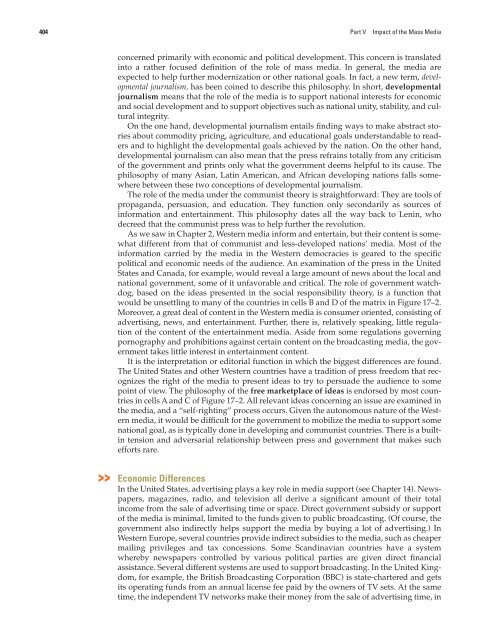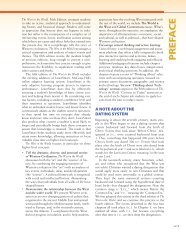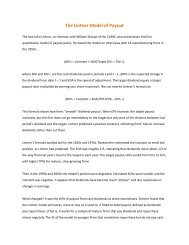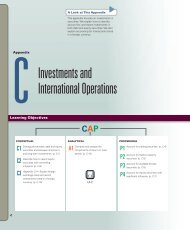Chapter 7: Radio (30629.0K) - McGraw-Hill
Chapter 7: Radio (30629.0K) - McGraw-Hill
Chapter 7: Radio (30629.0K) - McGraw-Hill
You also want an ePaper? Increase the reach of your titles
YUMPU automatically turns print PDFs into web optimized ePapers that Google loves.
404 Part V Impact of the Mass Media<br />
concerned primarily with economic and political development. This concern is translated<br />
into a rather focused definition of the role of mass media. In general, the media are<br />
expected to help further modernization or other national goals. In fact, a new term, developmental<br />
journalism, has been coined to describe this philosophy. In short, developmental<br />
journalism means that the role of the media is to support national interests for economic<br />
and social development and to support objectives such as national unity, stability, and cultural<br />
integrity.<br />
On the one hand, developmental journalism entails finding ways to make abstract stories<br />
about commodity pricing, agriculture, and educational goals understandable to readers<br />
and to highlight the developmental goals achieved by the nation. On the other hand,<br />
developmental journalism can also mean that the press refrains totally from any criticism<br />
of the government and prints only what the government deems helpful to its cause. The<br />
philosophy of many Asian, Latin American, and African developing nations falls somewhere<br />
between these two conceptions of developmental journalism.<br />
The role of the media under the communist theory is straightforward: They are tools of<br />
propaganda, persuasion, and education. They function only secondarily as sources of<br />
information and entertainment. This philosophy dates all the way back to Lenin, who<br />
decreed that the communist press was to help further the revolution.<br />
As we saw in <strong>Chapter</strong> 2, Western media inform and entertain, but their content is somewhat<br />
different from that of communist and less-developed nations’ media. Most of the<br />
information carried by the media in the Western democracies is geared to the specific<br />
political and economic needs of the audience. An examination of the press in the United<br />
States and Canada, for example, would reveal a large amount of news about the local and<br />
national government, some of it unfavorable and critical. The role of government watchdog,<br />
based on the ideas presented in the social responsibility theory, is a function that<br />
would be unsettling to many of the countries in cells B and D of the matrix in Figure 17–2.<br />
Moreover, a great deal of content in the Western media is consumer oriented, consisting of<br />
advertising, news, and entertainment. Further, there is, relatively speaking, little regulation<br />
of the content of the entertainment media. Aside from some regulations governing<br />
pornography and prohibitions against certain content on the broadcasting media, the government<br />
takes little interest in entertainment content.<br />
It is the interpretation or editorial function in which the biggest differences are found.<br />
The United States and other Western countries have a tradition of press freedom that recognizes<br />
the right of the media to present ideas to try to persuade the audience to some<br />
point of view. The philosophy of the free marketplace of ideas is endorsed by most countries<br />
in cells A and C of Figure 17–2. All relevant ideas concerning an issue are examined in<br />
the media, and a “self-righting” process occurs. Given the autonomous nature of the Western<br />
media, it would be difficult for the government to mobilize the media to support some<br />
national goal, as is typically done in developing and communist countries. There is a builtin<br />
tension and adversarial relationship between press and government that makes such<br />
efforts rare.<br />
>> Economic Differences<br />
In the United States, advertising plays a key role in media support (see <strong>Chapter</strong> 14). Newspapers,<br />
magazines, radio, and television all derive a significant amount of their total<br />
income from the sale of advertising time or space. Direct government subsidy or support<br />
of the media is minimal, limited to the funds given to public broadcasting. (Of course, the<br />
government also indirectly helps support the media by buying a lot of advertising.) In<br />
Western Europe, several countries provide indirect subsidies to the media, such as cheaper<br />
mailing privileges and tax concessions. Some Scandinavian countries have a system<br />
whereby newspapers controlled by various political parties are given direct financial<br />
assistance. Several different systems are used to support broadcasting. In the United Kingdom,<br />
for example, the British Broadcasting Corporation (BBC) is state-chartered and gets<br />
its operating funds from an annual license fee paid by the owners of TV sets. At the same<br />
time, the independent TV networks make their money from the sale of advertising time, in
















